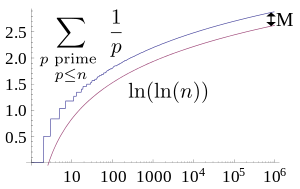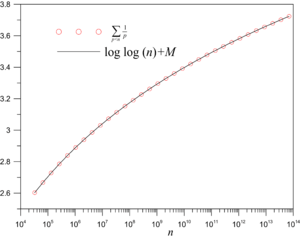Meissel–Mertens constant
The Meissel–Mertens constant (named after Ernst Meissel and Franz Mertens), also referred to as Mertens constant, Kronecker's constant, Hadamard–de la Vallée-Poussin constant or the prime reciprocal constant, is a mathematical constant in number theory, defined as the limiting difference between the harmonic series summed only over the primes and the natural logarithm of the natural logarithm:

Here γ is the Euler–Mascheroni constant, which has an analogous definition involving a sum over all integers (not just the primes).

The value of M is approximately
Mertens' second theorem establishes that the limit exists.
The fact that there are two logarithms (log of a log) in the limit for the Meissel–Mertens constant may be thought of as a consequence of the combination of the prime number theorem and the limit of the Euler–Mascheroni constant.
In popular culture
The Meissel-Mertens constant was used by Google when bidding in the Nortel patent auction. Google posted three bids based on mathematical numbers: $1,902,160,540 (Brun's constant), $2,614,972,128 (Meissel–Mertens constant), and $3.14159 billion (π).[1]
References
- Reuters (July 5, 2011). "Google's strange bids for Nortel patents". FinancialPost.com. Retrieved 2011-08-16.
External links
- Weisstein, Eric W. "Mertens Constant". MathWorld.
- On the remainder in a series of Mertens (postscript file)